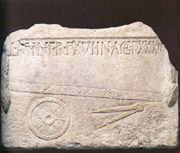
THE TOWN'S ECONOMIC LIFE
Many of the town's inhabitants were farmers, but the town's excellent geographic position with respect to the villages farther inland and the location of a river port not far from the sea also gave great impetus to trade.
Several kinds of arts and crafts also played an important role in the local economy. Some workshops were engaged in the whole wool manufacturing process from shearing to tailoring, while the washing and dying process was performed in the fullers' workshops. To bleach cloth the fullers used human urine which was collected directly from Pompeian households where it was stored in «portable» containers placed alongside the streets. Other workshops produced the famous fish sauce called «garum», while bread was made in over thirty bakeries with annexed mills.
Of course there was also a wealth of pottery makers and ceramists, blacksmiths, joiners and carpenters, marble carvers, goldsmiths and scriptores, i.e. artisans whose job it was to paint red and black election slogans and other notices to the public, most of which are still visible on the walls.
The wealthiest and most powerful corporation of artisans in the town was that of the wool makers and clothiers in general, as is confirmed by the imposing building in the Forum which they dedicated to the patron of their trade, the priestess Eumachia.
As the town was a flourishing trading centre, thousands of people would flock towards it every day from the surrounding areas. The hospitia (boarding houses) in which they found accommodation were either annexed to the cauponae (taverns) and thermopolia, where they could have a warm meal as in our modern-day fast food restaurants, or to the tabernae, which served the excellent wine from the vineyards on the slopes of Mount Vesuvius. Numerous, mostly one-room shops ran all along the main streets and all kinds of articles were on sale on masonry counters.
Almost every family even the relatively wealthy ones used to rent out rooms to passing tradesmen since it was an easy source of income. In many cases the owners were also directly in charge of sales, as is witnessed by the passageways between the residential areas of the houses and the shops.
Hordes of pedlars would travel to P0111peii every day to sell their goods on strategically placed stalls throughout the town, for example in the Forum and the surroundings of the Amphitheatre and especially near the town gates and along the banks of the river in the harbour.






